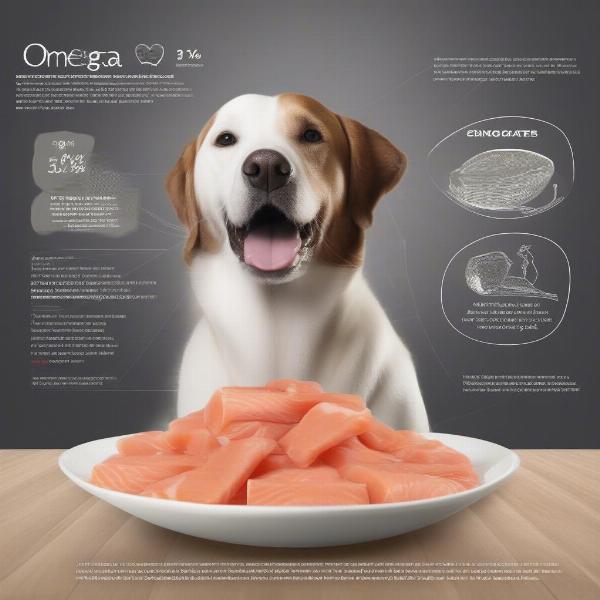Salmon and rice dog food is a popular choice among pet owners, often touted for its potential health benefits, particularly for dogs with sensitive stomachs or allergies. But is it the right choice for your dog? This comprehensive guide will delve into the pros and cons of salmon and rice dog food, exploring its nutritional value, suitability for different breeds and life stages, and helping you make an informed decision for your furry friend.
The Benefits of Salmon and Rice Dog Food
Salmon is a rich source of omega-3 fatty acids, EPA and DHA, which are crucial for maintaining healthy skin and coat, reducing inflammation, and supporting cognitive function. These essential fatty acids can also contribute to joint health, particularly beneficial for senior dogs or breeds prone to hip dysplasia. Rice, on the other hand, is a highly digestible carbohydrate that provides a good source of energy. It’s also a relatively hypoallergenic ingredient, making salmon and rice dog food a suitable option for dogs with food sensitivities. This combination can be particularly beneficial for dogs experiencing digestive issues, as it’s gentle on the stomach and can help firm up stool.
 Salmon and Rice Dog Food Benefits
Salmon and Rice Dog Food Benefits
Choosing the Right Salmon and Rice Dog Food
Not all salmon and rice dog foods are created equal. When selecting a brand, look for those that list salmon as the first ingredient, indicating it’s the primary protein source. Check the ingredient list for whole grains, fruits, and vegetables, which provide additional vitamins and minerals. Avoid foods with artificial colors, flavors, and preservatives. It’s also essential to consider your dog’s age, breed, and activity level. Puppies, for example, require higher protein and calorie content than adult dogs. salmon and brown rice dog food is a good option if you are looking for a specific blend.
Is Salmon and Rice Dog Food Right for My Dog?
While salmon and rice dog food can be a healthy choice for many dogs, it’s not a one-size-fits-all solution. Some dogs may be allergic to salmon, although it’s less common than allergies to beef or chicken.
Always consult with your veterinarian if you suspect your dog has a food allergy. They can perform tests to identify the allergen and recommend appropriate dietary changes. If your dog has specific dietary needs or health conditions, a customized diet might be necessary.
Addressing Common Concerns About Salmon and Rice Dog Food
Some pet owners express concerns about the potential for mercury contamination in salmon. While this is a valid concern, reputable dog food brands source their salmon from reputable fisheries and conduct rigorous testing to ensure safety. Another concern is the glycemic index of rice. While white rice has a higher glycemic index, brown rice is a healthier alternative. reviews of fromm dog food are helpful for making informed decisions.
Making the Switch to Salmon and Rice Dog Food
If you’re considering transitioning your dog to a salmon and rice diet, it’s important to do so gradually. Start by mixing a small amount of the new food with your dog’s current food, gradually increasing the proportion of salmon and rice dog food over several days. This helps prevent digestive upset and allows your dog to adjust to the new taste and texture. go solutions dog food also offers a gradual transition guide if you are switching from a different brand.
Conclusion
Salmon and rice dog food can be a nutritious and palatable option for many dogs, offering several health benefits. However, it’s crucial to choose a high-quality brand, consider your dog’s individual needs, and consult with your veterinarian if you have any concerns. By doing so, you can ensure your furry friend receives a balanced and healthy diet that supports their overall well-being. Remember to consider origen dog food for a high-quality option.
FAQ
- Is salmon and rice dog food good for puppies? While salmon is a good protein source, puppies have specific nutritional requirements. Consult with your veterinarian for breed-specific recommendations.
- Can salmon and rice dog food help with allergies? It can be helpful for dogs with certain food sensitivities, but it’s not a guaranteed solution for all allergies.
- How much salmon and rice dog food should I feed my dog? Follow the feeding guidelines on the packaging, adjusting the portion based on your dog’s age, breed, activity level, and overall health.
- What are the signs of a salmon allergy in dogs? Common signs include itchy skin, excessive licking or scratching, gastrointestinal upset, and ear infections.
- Is brown rice better than white rice in dog food? Brown rice is generally preferred as it has a lower glycemic index and provides more fiber.
- Can I make homemade salmon and rice dog food? While possible, it’s essential to consult with a veterinary nutritionist to ensure the recipe meets your dog’s nutritional needs.
- What are some good brands of salmon and rice dog food? Look for brands that prioritize high-quality ingredients, avoid artificial additives, and have positive customer reviews. Consider brands like Fromm, Go! Solutions, and Orijen for premium options.
Related Articles
About ILM Dog
ILM Dog is your trusted international resource for expert canine care and advice. We provide comprehensive and practical guidance on everything from breed selection and puppy care to senior dog health, nutrition, training, and grooming. Our goal is to empower dog owners worldwide with the knowledge and resources they need to provide the best possible care for their furry companions. Whether you’re a seasoned dog owner or just starting your journey, ILM Dog has the expertise to help you navigate every stage of your dog’s life. Contact us today for personalized support! Email: [email protected], Phone: +44 20-3965-8624.